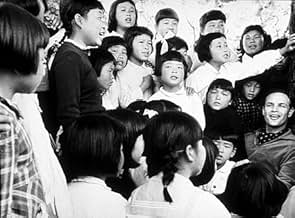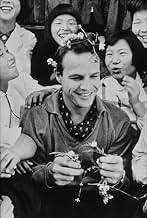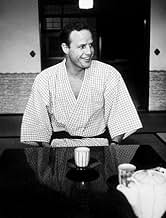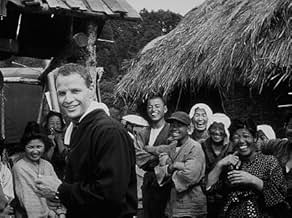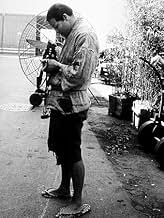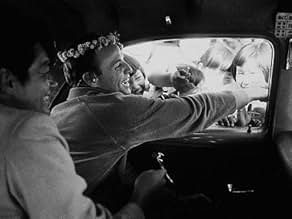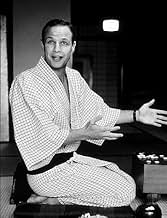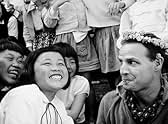Ajouter une intrigue dans votre langueIn post-WWII Japan, an American captain is brought in to help build a school, but the locals want a teahouse instead.In post-WWII Japan, an American captain is brought in to help build a school, but the locals want a teahouse instead.In post-WWII Japan, an American captain is brought in to help build a school, but the locals want a teahouse instead.
- Récompenses
- 1 victoire et 9 nominations
Machiko Kyô
- Lotus Blossom
- (as Machiko Kyo)
Harry Morgan
- Sgt. Gregovich
- (as Henry {Harry} Morgan)
Carlo Fiore
- Soldier
- (non crédité)
John Grayson
- Soldier
- (non crédité)
Harry Harvey Jr.
- Soldier
- (non crédité)
Miyoshi Jingu
- Old Woman on Jeep
- (non crédité)
Roger McGee
- Soldier
- (non crédité)
Dansho Miyazaki
- Sumata's Father
- (non crédité)
Minoru Nishida
- Mr. Sumata
- (non crédité)
Aya Oyama
- Daughter on Jeep
- (non crédité)
Histoire
Le saviez-vous
- AnecdotesProduction began with Louis Calhern playing Col. Purdy, but Calhern died after more than a month of filming. Paul Ford was quickly recruited, as he had created the role on Broadway, and this resulted a revived career for the lovable, irascible character actor.
- GaffesWhile Fisby and Sakini are finishing up their first address to the villagers Sakini asks Fisby what time it is. He responds that it's a quarter to 5:00. But the sun is directly over their heads as if it were noon.
- ConnexionsFeatured in Okinawa: Keystone of the Pacific (1973)
- Bandes originalesSakura Sakura (Cherry Blossoms)
(uncredited)
Written and Arranged by Kikuko Kanai
Sung by Lotus Blossom
Commentaire à la une
If you're not a fan of Glenn Ford's westerns, and you think he's merely an ordinary everyman, check out his timed perfection in The Teahouse of the August Moon. With such great talent, it's a wonder Jack Lemmon rose to stardom so quickly. Glenn has all the hesitation, stammering, exasperation, and desire to fix that it takes to be a comic genius. If the first time around, you don't catch all his jokes, don't worry. You were just laughing so hard, you couldn't keep up with the fast pace.
Every time I watch this delightful gem, I laugh myself sick. It does have a long running time, but it certainly goes by quickly. Glenn Ford's character is stationed in Okinawa after WWII, to oversee reconstruction and the wellbeing of the Japanese people. But in his mission to spread democracy, he's completely clueless in his new environment. Marlon Brando plays the scene-stealing Sakini, a Japanese interpreter who winks at and nudges the audience when he wants to make an inside joke. But even with an interpreter, Glenn still finds himself getting into one misunderstanding after another.
While it's seen as "white washing" by today's standards, Marlon Brando didn't intend for his performance to be offensive. In fact, he lived in a nearby Japanese village for four months to absorb the mannerisms, accent, and mentality of the local people. I found his portrayal of the savvy interpreter to be flawless; not only that, but I couldn't find any trace of his usual expressions or gestures. He completely transformed himself.
The story is heartwarming, funny, smart, and bittersweet. From Eddie Albert's obsession with soil and worms to Machiko Kyo's touching tea ceremony, this 1956 comedy is a one-of-a-kind gem with countless delightful moments.
Every time I watch this delightful gem, I laugh myself sick. It does have a long running time, but it certainly goes by quickly. Glenn Ford's character is stationed in Okinawa after WWII, to oversee reconstruction and the wellbeing of the Japanese people. But in his mission to spread democracy, he's completely clueless in his new environment. Marlon Brando plays the scene-stealing Sakini, a Japanese interpreter who winks at and nudges the audience when he wants to make an inside joke. But even with an interpreter, Glenn still finds himself getting into one misunderstanding after another.
While it's seen as "white washing" by today's standards, Marlon Brando didn't intend for his performance to be offensive. In fact, he lived in a nearby Japanese village for four months to absorb the mannerisms, accent, and mentality of the local people. I found his portrayal of the savvy interpreter to be flawless; not only that, but I couldn't find any trace of his usual expressions or gestures. He completely transformed himself.
The story is heartwarming, funny, smart, and bittersweet. From Eddie Albert's obsession with soil and worms to Machiko Kyo's touching tea ceremony, this 1956 comedy is a one-of-a-kind gem with countless delightful moments.
- HotToastyRag
- 20 mars 2022
- Permalien
Meilleurs choix
Connectez-vous pour évaluer et suivre la liste de favoris afin de recevoir des recommandations personnalisées
Détails
- Date de sortie
- Pays d’origine
- Langues
- Aussi connu sous le nom de
- The Teahouse of the August Moon
- Lieux de tournage
- Société de production
- Voir plus de crédits d'entreprise sur IMDbPro
Box-office
- Budget
- 3 926 000 $US (estimé)
- Durée2 heures 3 minutes
- Mixage
Contribuer à cette page
Suggérer une modification ou ajouter du contenu manquant

Lacune principale
By what name was La petite maison de thé (1956) officially released in India in English?
Répondre

